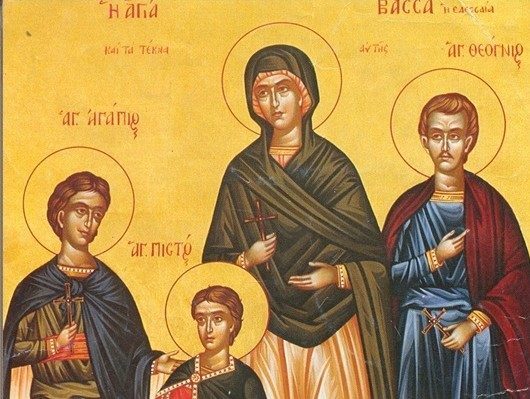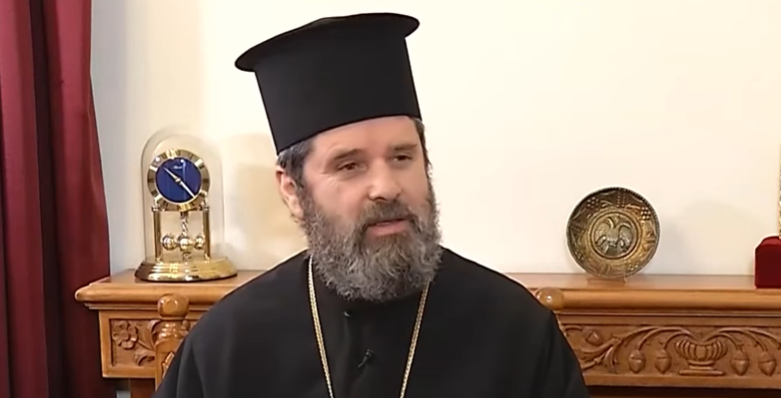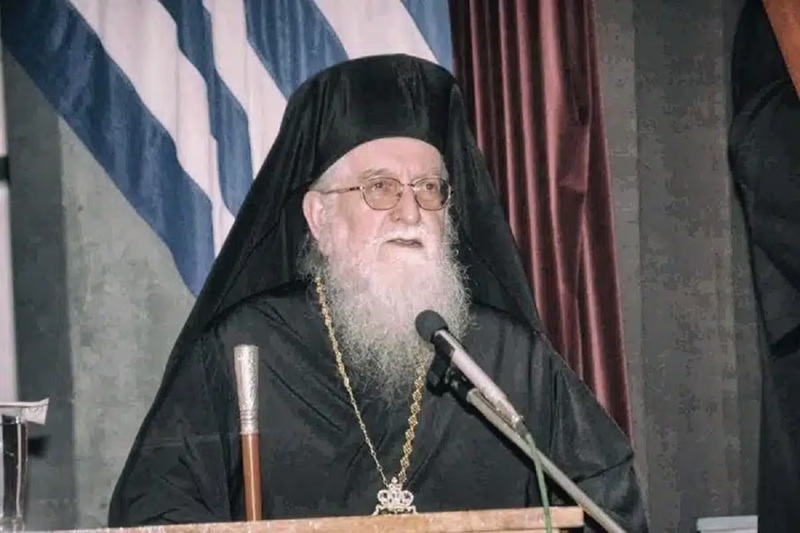Martyr Bassa of Edessa and her sons Theogonius, Agapius, and Pistus (21 August)

The Martyr Bassa with her sons Theognis, Agapius and Pistus, lived in the city of Macedonian Edessa and she was married to a pagan priest. From childhood she had been raised in the Christian Faith, which she passed on to her sons.
During the reign of the emperor Maximian Galerius (305-311), the husband denounced his wife and children to the governor. In spite of threats, the boys refused to offer sacrifice to idols, so they were tortured and put to death. The eldest son, Theognis, was raked with iron claws, then he was beheaded. The skin of the young Agapius was flayed from head to chest, but the martyr did not utter a sound. The youngest son Pistus was tortured and beheaded, just as his brothers had been. One account says that the three brothers suffered at Edessa in Macedonia. Another account says they died at Larissa in Thessaly, their homeland.
Saint Bassa was thrown into prison and was weakened by hunger, but an angel strengthened her with heavenly food. Under successive tortures she remained unharmed by fire, water and beasts. When they brought her to a pagan temple, she shattered the statue of Zeus. Then they threw the martyr into a whirlpool in the sea. But to everyone’s surprise a ship sailed up, and three radiant men pulled her up (Saint Νikόdēmos of the Holy Mountain (July 14) suggests that these were her children, martyred earlier). After eight days Saint Bassa came by ship to the governor of the island of Alona, not far from Cyzicus, in the Propontis or Sea of Marmora. After beating her with rods, they beheaded her.
By the year 450 there was already a church in honor of the holy martyr Bassa at Chalcedon.
The Martyrs were from Edessa of Macedonia. Bassa was the wife of a certain Valerian, a priest of the idols, to whom she bore three sons and raised them in piety. She was betrayed with her sons to the proconsul by her own husband; each of her sons was tormented before her and beheaded. For refusing to worship the idols, she was imprisoned, cast into water and then fire, was stoned, and remaining unharmed, was brought to the temple to worship the idols. Laying hold upon the idol of Zeus, she overturned it and broke it to pieces. After being preserved through further torments, she was beheaded, about the year 290, in the reign of Maximian.
Bassa was the wife of an idolatrous pagan priest, but was secretly a Christian. She educated her sons in Christianity. Her husband hated her because of her faith, and gave her and her sons over to the judge for torture. After harsh tortures, her sons were beheaded (it is believed that this occurred at Edessa, in Macedonia). Bassa was joyful when she saw her sons honorably completing their heroic martyrdoms for Christ; and she, with even greater eagerness, went from torture to torture. When they threw Bassa into the sea, angels appeared to her and brought her to an island in the Sea of Marmara, where she was later beheaded during the rule of Maximian. Thus St. Bassa was made worthy of the Kingdom of Christ in a twofold manner–as a martyr, and as a mother of martyrs.
Apolytikion of Martyr Bassa and her Children
Fourth Tone
Thy Martyrs, O Lord, in their courageous contest for Thee received as the prize the crowns of incorruption and life from Thee, our immortal God. For since they possessed Thy strength, they cast down the tyrants and wholly destroyed the demons’ strengthless presumption. O Christ God, by their prayers, save our souls, since Thou art merciful.
Kontakion of Martyr Bassa and her Children
Plagal of the Fourth Tone
Valiantly following the footsteps of Solomone, thou gavest courage to thy sons to suffer martyrdom, O divinely-blessed Bassa, thou rock of courage. And when thou hadst thrice endured thy three sons’ sufferings, thou through many grievous torments wast joined unto them. Hence, we cry to you: Rejoice, O victors in martyrdom.




